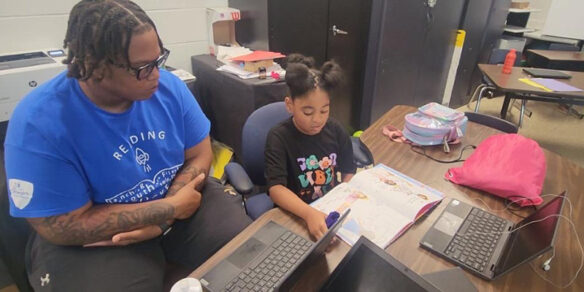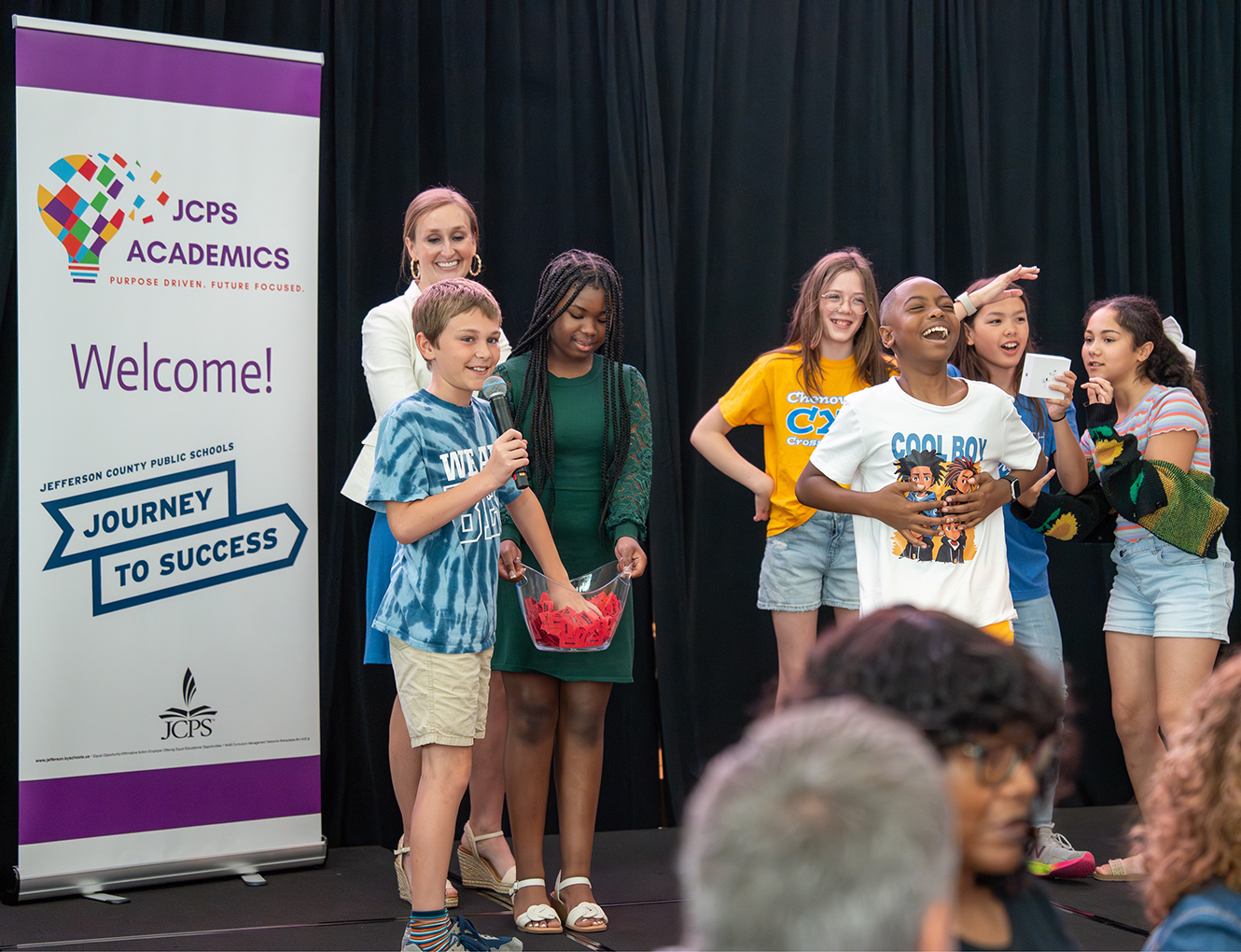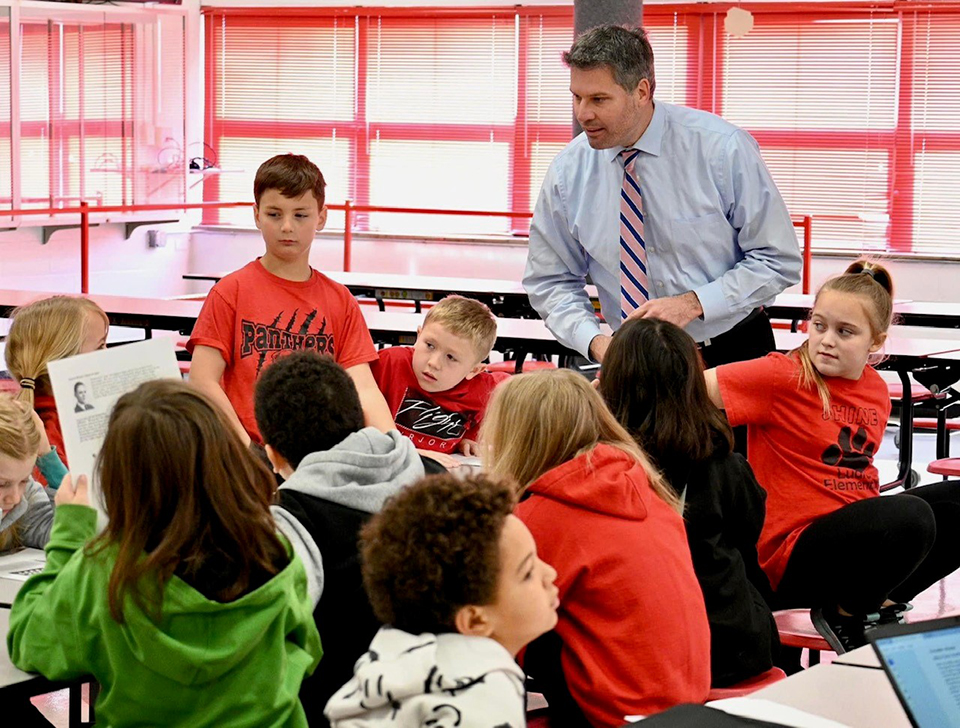
The Kentucky Department of Education is providing two out-of-school programs in Jefferson and Fayette counties with $500,000 each in federal funds this summer. The St. George’s Scholar Institute, a youth development agency in Jefferson County that provides quality, out-of-school programming for vulnerable youth in West Louisville, is expanding its tutoring efforts this summer with the additional funding.
Submitted photo
The Kentucky Department of Education (KDE) is providing two out-of-school programs in Jefferson and Fayette counties with $500,000 each in federal funds this summer.
The federal money, which comes from the American Rescue Plan and Elementary and Secondary School Emergency Relief funds (ARP ESSER), will support two programs, run by the National Center for Families Learning (NCFL) and the St. George’s Scholar Institute. ARP ESSER funding supports the safe and sustained return to in-person learning and expands equity by supporting students who need it most, particularly those most impacted by the COVID-19 pandemic.
Both efforts, the National Center for Families Learning in Jefferson and Fayette counties and the St. George’s Scholar Institute program in Jefferson County, support one of the three big ideas from United We Learn – encouraging innovation in our schools to better prepare students for life after graduation.
This summer, NCFL will be hiring and training tutors to expand its early literacy tutoring programs in Kentucky, which will start this fall and reach more than 200 elementary students across Jefferson and Fayette counties.
“Although this is a one-year endeavor, (the National Center for Families Learning) feels strongly that we can improve literacy and learning opportunities based on these small group or one-to-one tutoring efforts,” said Felicia Cumings Smith, president and CEO of the National Center for Families Learning.
The center’s goal is to help eradicate poverty by working with families to provide support for their children’s education. They believe that the best way to support student success is through shared collaboration, not only in schools, but also among family and community members. They provide resources and guidance to help families further their children’s learning outside of the classroom.
The center’s tutoring support will engage students’ curiosity and build literacy skills, while also supporting families as they read with their children at home, said Cumings Smith.
“We have had a long-standing partnership with the National Center for Families Learning and we are just really impressed with their emphasis on family and community engagement,” said the Kentucky Department of Education’s Deputy Commissioner and Chief Equity Officer Thomas Woods Tucker.
St. George’s Scholar Institute is also expanding its tutoring efforts this summer. Their Stay Ahead math and reading tutoring program will serve more than 100 students from grades K-8 in Jefferson County. The program started June 17 and will take place over six weeks at Crums Lane Elementary school in Louisville, and virtually for students that need it within the county. Teachers with Jefferson County Public Schools created an evidence-based curriculum and work with the students.

St. George’s Scholar Institute’s Stay Ahead math and reading tutoring program is serving more than 100 students from grades K-8 in Jefferson County due to ARP ESSER money provide by the Kentucky Department of Education. The program started June 17 and will take place over six weeks at Crums Lane Elementary school in Louisville, and virtually for students that need it within the county. Teachers with Jefferson County Public Schools created an evidence-based curriculum and work with the students.
Submitted photo
“What we’ve seen post-pandemic is that (across Jefferson County), kids are struggling in reading and math, particularly in marginalized neighborhoods,” said St. George’s Executive Director Arthur Cox. “Kids that don’t have the resources to pay for tutoring definitely need these funds to get them to grade level. I can’t speak highly enough about the appreciation for the Kentucky Department of Education, because this is a sorely needed resource.”
The St. George’s Scholar Institute is a youth development agency in Jefferson County that provides quality, out-of-school programming for social, emotional and academic learning for vulnerable youth in West Louisville.
“St. George’s has a longstanding commitment to West Louisville, working in some of the most economically and socially challenging areas in all of Kentucky,” said Tucker. “They’ve done a tremendous job with many students and families in the area that they serve.”
Tucker says funding these programs was a step in addressing the recent learning loss and the infrastructure of schools across the state.
The Congressionally mandated National Assessment of Educational Progress (NAEP), also known as “The Nation’s Report Card,” provides information to help improve education policy and practice. According to its 2022-2023 assessment, the average scores nationally have declined 7 points in reading and 14 points in mathematics compared to the past decade.
“We look forward to students gaining some academic ground in both literacy and numeracy,” said Tucker. “When you look at the (NAEP) results, they’re some of the lowest rates we’ve seen in almost a decade and a half, so we really had a moral obligation with the funds that the government provided us to do whatever we could to close those opportunity gaps by working with our partners.”



Leave A Comment